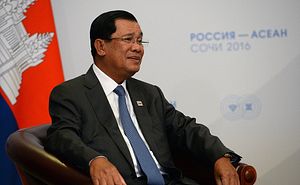The dissolution of the Cambodia National Rescue Party (CNRP), the only relevant opposition party in Cambodia, caught a lot attention abroad, but was not the main event in 2017. It was just one part of a fundamental strategic change that affects not only Cambodia’s domestic politics, but also its international relations.
The deterioration of Cambodia’s ties to the United States was merely collateral damage of the democratic destruction. Instead, during the whole year, tensions were actively pushed by the Cambodian government, without a sufficiently plausible reason. With the visa sanctions imposed by the United States in early December, relations reached a new low, with grave disadvantages for both sides.
On the one hand, Cambodian foreign policy threatens to lose its balance, which has always been a huge advantage for any small nation surrounded by strong regional forces. Without good relations to the main player in the international order, Cambodia’s dependency on other nations is likely to increase. Moreover, Cambodia needs to settle its dispute about a debt the United States granted in the 1970s if it wants to become a member of the International Monetary Fund. On the other hand, the United States forfeits regional influence in the superior rivalry with China. While busy with other conflicts (North Korea and Iran are top issues on the agenda while Syria, Libya, and Ukraine could return any time), the U.S. administration lacks both the capacity and political will to prioritize the dispute with Cambodia. Most likely, Washington will try counterbalancing the loss of influence in Cambodia by strengthening ties with Thailand and Vietnam.
Automatically, this begs the question whether China is just the beneficiary of eroding Cambodian-American relations or the driving force behind it. Over the last years, Cambodia has become the biggest recipient of international aid granted by the Beijing government, consistently labeled as unconditional by its counterparts in Phnom Penh – who, so far, have failed to explain why it is advantageous putting all of Cambodia’s eggs in one basket. With this one-sided orientation, Cambodia also risks its regional relations within ASEAN, where several states – especially Vietnam and the Philippines – have disputes with China over overlapping territorial claims in the South China Sea.
However, it would be premature to label China as a strong backer of the current Cambodian government against domestic challengers such as the CNRP. Instead, Beijing attaches high importance to political stability in Cambodia, irrespective of its rulers. To safeguard its long-term interests, China uses extensive foreign direct investments, business linkages, and growing exclusive Chinese enclaves in society as well as closed loops in the economy – sometimes criticized as neocolonialism by international observers – to cement its influence beyond political relations. There is no indication that this systematic appropriation will decelerate in the near future, with unpredictable effects on the domestic population.
While China is the most influential foreign player in Cambodia, being under its tutelage brings one crucial weakness. Cambodia heavily depends on its access to Western markets, in particular for the products of its apparel industry, which is eased by preferential trade treatment. After the dissolution of the CNRP, calls to review these de facto subsidies, especially the Everything But Arms (EBA) scheme set up by the European Union, became louder. On December 12, the European Parliament sent a strong message by adopting a resolution in which it calls on the EU “to consider the temporary withdrawal of trade preferences given under the EBA scheme.”
Nevertheless, it is very unlikely that EBA will be suspended by the EU in the near future. It is widely regarded as a last resort and should not be wasted on an incident that has not provoked any internal unrest in Cambodia. In addition, the EU’s Common Foreign and Security Policy is subject to unanimity and several Eastern European states have already signalized that they are not interested in revising EU-Cambodian relations. Among these states, Hungary enjoys excellent bilateral relations with China, a relationship that cannot be underestimated with regard to the European approach.
Thus, political reactions to the dissolution are limited to some minor adjustments in development cooperation – and to an opening for Cambodian asylum seekers among former CNRP members and civil society activists. Such a release valve stabilizes the current Cambodian government (although this is not intended by Western states). There is a second, even more important outlet for Cambodians: Thailand offers work – sometimes under subhuman conditions – for hundreds of thousands Cambodians who cannot be absorbed by the Cambodian economy. As long as dissatisfied and marginalized people are able to leave Cambodia easily, the country remains stable despite increasing political repression.
Consequently, all international partners of Cambodia are well advised to assume the continuity of the current leadership. It will emerge strengthened from 2017, when Western states lost considerable ground in favor of Chinese expansion – although it is reasonable to doubt whether this strategic shift is beneficial for the whole country.
Dr. Markus Karbaum is a political scientist and an independent consultant specializing in Cambodian politics.

































